Datasheet
Year, pagecount:2009, 3 page(s)
Language:English
Downloads:2
Uploaded:April 23, 2018
Size:1 MB
Institution:
-
Comments:
Freie Universitat Berlin
Attachment:-
Download in PDF:Please log in!
Comments
No comments yet. You can be the first!Most popular documents in this category
Content extract
FUBiS Source: http://www.doksinet International Summer and Winter University (FUBiS) Islam & the West Islam & the West For the first time Freie Universität Berlin International Summer and Winter University FUBiS and the foundation Avec et pour Autres jointly organized the course “Islam & the West: Deconstructing the Other – Going Beyond the Clash of Civilizations and Intercultural Dialogue”. The course took place from July 19 – August 16, 2008 Thanks to scholarships provided by the foundation Avec et pour Autres, students from the Middle East and Western countries were able to participate in this class. Through selected readings – theoretical and methodological essays as well as short ethnographies – this special class explored the changing locus and the significance of the “cultural other” in the constructions of Islam and the West in the contemporary world. Islam and the West have become powerful connotations, discursive realities and influential
constructions beyond their mere terminological meaning. They inform people‘s behaviour and have become inscribed in everyday social and political practice. The class addressed and analized the implications of these powerful discursive constructions on politics as well as the role and function of the ubiquitous notion of intercultural dialogue. Approaches taken from postmodern theories formed the theoretical backbone of the course. Grouped around the notions of culture, identity, public spheres, performativity (speech acts) and migration, the theories were critically assessed and put into the context of Islam and the West. The course also included an exploration of Islam in Berlin through various excursions and debates with people occupying the spaces in between Islam and the West. Behind the curtain of Islam and the West Carmen Becker, instructor of the course, has a degree in Political Science from Freie Universität Berlin and is currently a PhD fellow at the International
Institute for the Study of Islam in the Modern World (ISIM) in the Netherlands. She conducts research on the transformation of Salafism in the modern media. Her first day of FUBiS was as intriguing as it was sobering. Listening to the introductions of the students and their motivation to look beyond the dialogue and clash of civilisation meant 21 participants, 21 ideas about the course and eventually also 21 cultures. As for her, she was faced with the challenge of satisfying the needs of all participants, but also plain curiosity of how the course would develop. The course was not designed to find out who is right or who is wrong, Islam or the West. Rather, the task was to deconstruct commonly assumed ideas about the other and to look Source: http://www.doksinet at the historical development within the specific context of abstract ideas like secularity, about Berlin religiosity, gender, human rights, freedom, and many more. But does this mean that the “The fact that there are
Muslim immigrant communities here, and that they are accessible to us controversial debates, the so-called war on terror and the very identities of Islam and the as students, added much to the overall direction and dimension of the course.” West are just virtual and all constructed without having any real substance? * Nancy Demerdash (USA) The answer is neither yes nor no, as the students have taught Carmen Becker. The ways conflicts are framed in public might be constructed, distorted or simply made up. However, conflict exists. Within and across societies different ideas about what constitutes a good life emerge and coin the debates – a natural social dynamic, it seems. But what should we do when ideas, standpoints, and behaviours become irreconcilable and lead to violence? about Berlin “I have learned a great deal from both the environs of Berlin, its Muslim communities, and colleagues in my class during this period here. The excursions to Kreuzberg and the Museum of
Islamic Art in the Pergamon were especially informative and insightful.” Whose ideas have the right of way? What happens to people who are neither Islam nor about the course the West or who are both? The class discussions touched the question of power and the “I don‘t know if my perceptions or outlooks are radically different after this course, but I can instrumentalisation of politics for the interest of a few. Islam and the West turned out to say that my peers have contributed to my intellectual growth and understanding of what it be concepts that have developed their own dynamic, are used as a template reconfiguring means to live in the „Muslim world,“ and what it means for them to be Muslim, living in a current discourses and still develop their own reality. transnational, globalized world. It was interesting to hear about their upbringing and backgrounds and their experiences growing up in the Middle East, and their hopes for the future” The answers to all
these questions were complex, contradictory and sometimes painful when our own convictions were put into question. That we were not discussing mere abstract ideas became clear when visiting mosques or Kreuzberg, an area of Berlin known for the diverse backgrounds of its residents. Since no clear answers to all the questions are to be expected, is a course like this worthwhile? Carmen Becker is convinced more than ever that it is, “unless we are satisfied with answers that propagate ‘black-and-white’/’good-andevil’ solutions which can breed violence”. * Rohullah Esmatti (Afghanistan) about the course “Although there exists a negative image of Muslims in the West, I think that establishing this course is very useful for understanding especially among the young generation to r emove this kind of discrimination and misunderstanding and have a peaceful society without discriminationand war.” * Impressions from course participants Dina el-Sharnouby (Egypt) *
Hermeen Adam (UAE) about Berlin “I see the lives of Muslims in Berlin as part of a diverse reality that allows for a multitude of ways to practice religion. There might be a popular way to practice religion but at least there is about the course „Islam and the West are harder topics to approach than I would have thought. On the other hand it seemed to me at times that we are discussing topics all and over again without reachinganything, not even tolerance towards the „other“ which was at times disappointing. Yet I have discovered myself and how I am standing towards Islam and the West. I have also a choice to be made, there are options.” realized the importance of not complicating issues at times and not being too aggressive about about the course them to be able to have a discourse.” “The variety of nationalities is probably one of the better aspects of the course. I think I * benefited greatly not only because people came from different geographical
backgrounds which Nora Derbal (Germany) in turn in some ways formed their perspective, but the varying academic background also added about the course to the discussions. It brought in great view points” * Anselm Ibing (Germany) about the West and Islam “My idea of the West and Islam has changed. Mostly, I realised how diverse we all are and „What I especially liked about the course was the combination between theory and praxis. To watch documentaries in the class having media theories in mind or visiting an exhibition on gender in Iran combined with theories on gender have enriched my understanding of certain topics. I’ll try to incorporate the use of “new media” and the combination of theory and praxis in my further studies.” how dangerous it is to generalise and that in fact, we must try as hard as we can not to do so. As Alexandre Dumas already said: „All generalizations are dangerous, even this one“ It was amazingto hear views from Afghanistan, from
the Gulf, from Iran and all other places. Especially the Gulf was important for me, because it very often didn‘t fit our ideas of an „Islamic society“, when we were trying to generalise. things are quite different there, it seems” about Berlin “I think Berlin is an excellent place for this course. So many immigrants You can find someone who speaks Arabic on every corner. And you can see all levels of integration, all of the problems associated with it and all the beauties, too, of course!” FUBiS – Freie Universität Berlin International Summer and Winter University FUBiS is the largest multi-disciplinary summer and winter university program in Germany. Every year about 500 students from more than 60 countries attend the FUBiS academic classes. It is FUBiS’ mission to provide international students with a premier study abroad program delivering the highest academic quality and furthering the development of intercultural competence. FUBiS sessions run for 4 to 6 weeks
and take place both in summer * Tom Verde (USA) and winter. FUBiS’ goal is to provide a stimulating and rewarding experience – academically, culturally, and personally about nationalities FUBiS also provides a cultural program and social activities. Students have the opportunity “The variety of participating nationalities tremendously added to the course in that we had the to go on excursions to Dresden, Hamburg, and Weimar; visit the federal parliament, go opportunity to discuss topics from various perspectives and gain insight into other cultures. This on a Berlin Wall tour, go on a river boat tour through downtown Berlin, or watch popular should always be an element of this course.” German movies with fellow students during the FUBiS Movie-Time. Source: http://www.doksinet Curriculum FUBiS offers intensive and semi-intensive German language classes at five different proficiency levels. In addition FUBiS offers subject classes on various topics Most subject
classes are held in English by distinguished German and international faculty. In many cases courses and credits may be counted toward a major or minor at a student’s home institution. Program Structure The FUBiS program offers students many choices: • Combination of language and subject classes. This allows students to improve their language skills as well as further their knowledge of a subject matter. • Combination of two subject classes • Intensive German language classes. These classes meet every weekday and allow students to focus on and thus considerably improve their German skills. • Participation in either one semi-intensive German class or in one subject class. Freie Universität Berlin Freie Universität Berlin is a premier destination for research and education in Europe. It is ranked nationally and internationally among the top research universities in Germany. In 2007 after an intense, nation-wide competition, Freie Universität Berlin became one of nine
German universities to be awarded an Elite status by the German Research Foundation (DFG). In the Excellence Initiative competition Freie Universität Berlin won the highest number of grants and was selected for its outstanding graduate programs, excellent research clusters and successful internationalization strategy. The university campus is located in a charming and mostly residential section of former “West-Berlin”. Yet – thanks to Berlin’s superb public transportation network – it is within C ontact easy reach of the city’s downtown areas. Contact: Freie Universität Berlin International Summer and Winter University FUBiS c/o ERG Universitätsservice GmbH Otto-von-Simson-Str. 26 14195 Berlin, Germany E-mail: fubis@fubis.org Phone: + 49 + 30 + 838 73472 Fax: + 49 + 30 + 838 73442 www.fubisorg
constructions beyond their mere terminological meaning. They inform people‘s behaviour and have become inscribed in everyday social and political practice. The class addressed and analized the implications of these powerful discursive constructions on politics as well as the role and function of the ubiquitous notion of intercultural dialogue. Approaches taken from postmodern theories formed the theoretical backbone of the course. Grouped around the notions of culture, identity, public spheres, performativity (speech acts) and migration, the theories were critically assessed and put into the context of Islam and the West. The course also included an exploration of Islam in Berlin through various excursions and debates with people occupying the spaces in between Islam and the West. Behind the curtain of Islam and the West Carmen Becker, instructor of the course, has a degree in Political Science from Freie Universität Berlin and is currently a PhD fellow at the International
Institute for the Study of Islam in the Modern World (ISIM) in the Netherlands. She conducts research on the transformation of Salafism in the modern media. Her first day of FUBiS was as intriguing as it was sobering. Listening to the introductions of the students and their motivation to look beyond the dialogue and clash of civilisation meant 21 participants, 21 ideas about the course and eventually also 21 cultures. As for her, she was faced with the challenge of satisfying the needs of all participants, but also plain curiosity of how the course would develop. The course was not designed to find out who is right or who is wrong, Islam or the West. Rather, the task was to deconstruct commonly assumed ideas about the other and to look Source: http://www.doksinet at the historical development within the specific context of abstract ideas like secularity, about Berlin religiosity, gender, human rights, freedom, and many more. But does this mean that the “The fact that there are
Muslim immigrant communities here, and that they are accessible to us controversial debates, the so-called war on terror and the very identities of Islam and the as students, added much to the overall direction and dimension of the course.” West are just virtual and all constructed without having any real substance? * Nancy Demerdash (USA) The answer is neither yes nor no, as the students have taught Carmen Becker. The ways conflicts are framed in public might be constructed, distorted or simply made up. However, conflict exists. Within and across societies different ideas about what constitutes a good life emerge and coin the debates – a natural social dynamic, it seems. But what should we do when ideas, standpoints, and behaviours become irreconcilable and lead to violence? about Berlin “I have learned a great deal from both the environs of Berlin, its Muslim communities, and colleagues in my class during this period here. The excursions to Kreuzberg and the Museum of
Islamic Art in the Pergamon were especially informative and insightful.” Whose ideas have the right of way? What happens to people who are neither Islam nor about the course the West or who are both? The class discussions touched the question of power and the “I don‘t know if my perceptions or outlooks are radically different after this course, but I can instrumentalisation of politics for the interest of a few. Islam and the West turned out to say that my peers have contributed to my intellectual growth and understanding of what it be concepts that have developed their own dynamic, are used as a template reconfiguring means to live in the „Muslim world,“ and what it means for them to be Muslim, living in a current discourses and still develop their own reality. transnational, globalized world. It was interesting to hear about their upbringing and backgrounds and their experiences growing up in the Middle East, and their hopes for the future” The answers to all
these questions were complex, contradictory and sometimes painful when our own convictions were put into question. That we were not discussing mere abstract ideas became clear when visiting mosques or Kreuzberg, an area of Berlin known for the diverse backgrounds of its residents. Since no clear answers to all the questions are to be expected, is a course like this worthwhile? Carmen Becker is convinced more than ever that it is, “unless we are satisfied with answers that propagate ‘black-and-white’/’good-andevil’ solutions which can breed violence”. * Rohullah Esmatti (Afghanistan) about the course “Although there exists a negative image of Muslims in the West, I think that establishing this course is very useful for understanding especially among the young generation to r emove this kind of discrimination and misunderstanding and have a peaceful society without discriminationand war.” * Impressions from course participants Dina el-Sharnouby (Egypt) *
Hermeen Adam (UAE) about Berlin “I see the lives of Muslims in Berlin as part of a diverse reality that allows for a multitude of ways to practice religion. There might be a popular way to practice religion but at least there is about the course „Islam and the West are harder topics to approach than I would have thought. On the other hand it seemed to me at times that we are discussing topics all and over again without reachinganything, not even tolerance towards the „other“ which was at times disappointing. Yet I have discovered myself and how I am standing towards Islam and the West. I have also a choice to be made, there are options.” realized the importance of not complicating issues at times and not being too aggressive about about the course them to be able to have a discourse.” “The variety of nationalities is probably one of the better aspects of the course. I think I * benefited greatly not only because people came from different geographical
backgrounds which Nora Derbal (Germany) in turn in some ways formed their perspective, but the varying academic background also added about the course to the discussions. It brought in great view points” * Anselm Ibing (Germany) about the West and Islam “My idea of the West and Islam has changed. Mostly, I realised how diverse we all are and „What I especially liked about the course was the combination between theory and praxis. To watch documentaries in the class having media theories in mind or visiting an exhibition on gender in Iran combined with theories on gender have enriched my understanding of certain topics. I’ll try to incorporate the use of “new media” and the combination of theory and praxis in my further studies.” how dangerous it is to generalise and that in fact, we must try as hard as we can not to do so. As Alexandre Dumas already said: „All generalizations are dangerous, even this one“ It was amazingto hear views from Afghanistan, from
the Gulf, from Iran and all other places. Especially the Gulf was important for me, because it very often didn‘t fit our ideas of an „Islamic society“, when we were trying to generalise. things are quite different there, it seems” about Berlin “I think Berlin is an excellent place for this course. So many immigrants You can find someone who speaks Arabic on every corner. And you can see all levels of integration, all of the problems associated with it and all the beauties, too, of course!” FUBiS – Freie Universität Berlin International Summer and Winter University FUBiS is the largest multi-disciplinary summer and winter university program in Germany. Every year about 500 students from more than 60 countries attend the FUBiS academic classes. It is FUBiS’ mission to provide international students with a premier study abroad program delivering the highest academic quality and furthering the development of intercultural competence. FUBiS sessions run for 4 to 6 weeks
and take place both in summer * Tom Verde (USA) and winter. FUBiS’ goal is to provide a stimulating and rewarding experience – academically, culturally, and personally about nationalities FUBiS also provides a cultural program and social activities. Students have the opportunity “The variety of participating nationalities tremendously added to the course in that we had the to go on excursions to Dresden, Hamburg, and Weimar; visit the federal parliament, go opportunity to discuss topics from various perspectives and gain insight into other cultures. This on a Berlin Wall tour, go on a river boat tour through downtown Berlin, or watch popular should always be an element of this course.” German movies with fellow students during the FUBiS Movie-Time. Source: http://www.doksinet Curriculum FUBiS offers intensive and semi-intensive German language classes at five different proficiency levels. In addition FUBiS offers subject classes on various topics Most subject
classes are held in English by distinguished German and international faculty. In many cases courses and credits may be counted toward a major or minor at a student’s home institution. Program Structure The FUBiS program offers students many choices: • Combination of language and subject classes. This allows students to improve their language skills as well as further their knowledge of a subject matter. • Combination of two subject classes • Intensive German language classes. These classes meet every weekday and allow students to focus on and thus considerably improve their German skills. • Participation in either one semi-intensive German class or in one subject class. Freie Universität Berlin Freie Universität Berlin is a premier destination for research and education in Europe. It is ranked nationally and internationally among the top research universities in Germany. In 2007 after an intense, nation-wide competition, Freie Universität Berlin became one of nine
German universities to be awarded an Elite status by the German Research Foundation (DFG). In the Excellence Initiative competition Freie Universität Berlin won the highest number of grants and was selected for its outstanding graduate programs, excellent research clusters and successful internationalization strategy. The university campus is located in a charming and mostly residential section of former “West-Berlin”. Yet – thanks to Berlin’s superb public transportation network – it is within C ontact easy reach of the city’s downtown areas. Contact: Freie Universität Berlin International Summer and Winter University FUBiS c/o ERG Universitätsservice GmbH Otto-von-Simson-Str. 26 14195 Berlin, Germany E-mail: fubis@fubis.org Phone: + 49 + 30 + 838 73472 Fax: + 49 + 30 + 838 73442 www.fubisorg
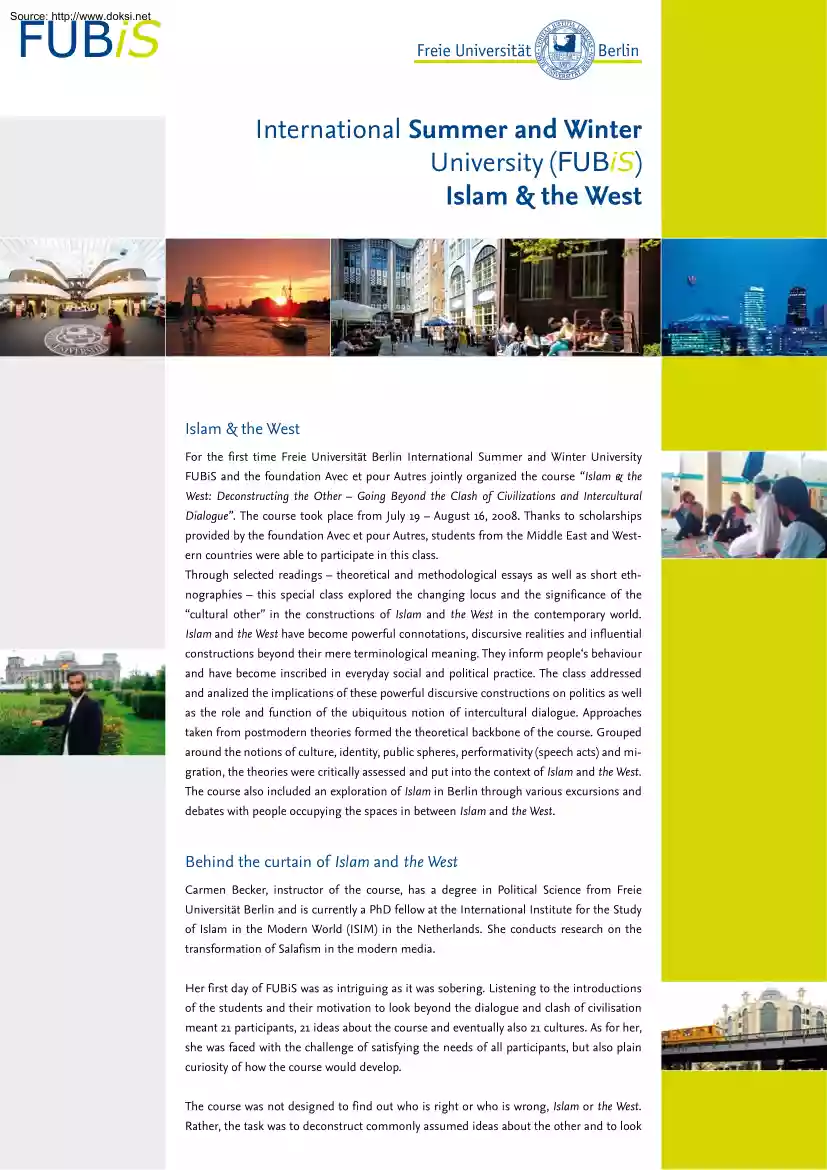
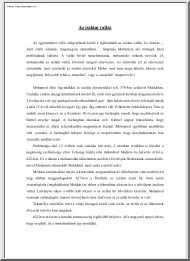
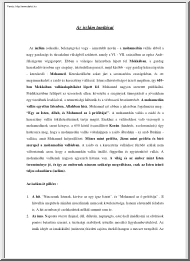
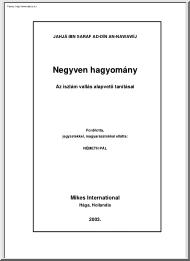
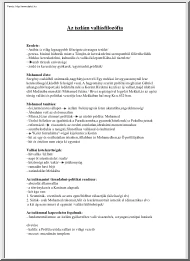
 Just like you draw up a plan when you’re going to war, building a house, or even going on vacation, you need to draw up a plan for your business. This tutorial will help you to clearly see where you are and make it possible to understand where you’re going.
Just like you draw up a plan when you’re going to war, building a house, or even going on vacation, you need to draw up a plan for your business. This tutorial will help you to clearly see where you are and make it possible to understand where you’re going.